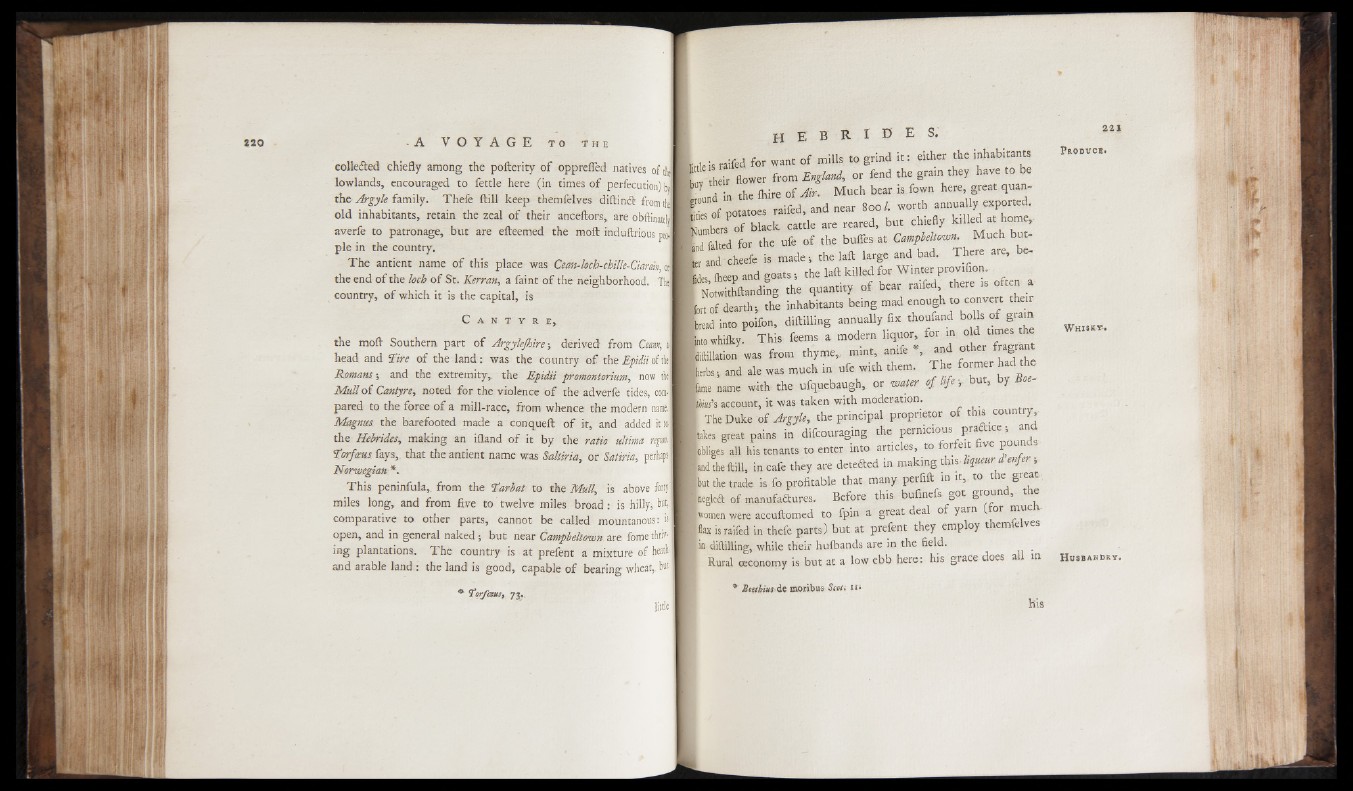
collected chiefly among the pofterity of opprefled natives of tfi
lowlands, encouraged to fettle here (in times of perfecution) ¡1
the Argyle family. Thefe ftill keep themfelves diftinct from t j
old inhabitants, retain the zeal of their anceftors, are obftinatelfl
averfe to patronage, but are efteemed the moil induftrious pad
pie in the country.
The antient name o f this place was Cean-loch-chille-Ciaram, oH
the end of the loch of St. Kerran, a faint of the neighborhood. Tit!
country, of which it is the capital, is
C A N T Y R E ,
the moft Southern part of Argylejhire; derived from Cearnt, ¡1
head and Tire of the land: was the country o f the Epidii of M
Romans; and the extremity, the Epidii promontorium, now tltj
Mull of Cantyre, noted for the violence o f the adverfe tides, com-]
pared to the force o f a mill-race, from whence the modern name.]
Magnus the barefooted made a conqueft o f it, and added it tol
the Hebrides, making an iiland o f it by the ratio ultima ngm\
Torfceus fays, that the antient name was Saltiria, or Satiria, perhaps
Norwegian*.
This peninfula, from the Tarbat to the Mull, is above forty I
miles long, and from five to twelve miles broad: is hilly, but,,]
comparative to other parts, cannot be called mountanous: is]
open, and in general naked; but near Campbeltown are fome thriving
plantations. The country is at prefent a mixture o f heath
and arable land: the land is good, capable of bearing wheat,, but
* itorfcsusp 73.
little
Irtleis raifed for want of mills to grind it: either the inhabitants
O S flower from England, or fend the gram they have to be
1 ' a in the ihire of Air. Much bear is fown here, great quan-
t - g g S ' I , 8 » £ .occh » „ » .Im p o r t e d ,
f T i , J 0f black, tattle are reared, but clued; killed a. home,-
I d M fo, K life a the buire. a. C - # * ™ but-
I r and cheefe is made; the laft large and bad. There are, be-
ides iheep and goats ; the laft killed for Winter provifion.
I Notwithftanding the quantity of bear raifed t ere is o t e n a
L i t of dearth; the inhabitants being mad enough to convert their, tread into poifon, diftilling annually fix thoufand Krfym
Lowhilky. This feems a modern liquor, for in old times the
JiftiMon was from thyme, mint, anife *, and other fragran
Kerbs; and ale was much in ufe with them. The former had the- Kune name with; the ufquebaugh, or water of life ~T but, by Eoe-
Piw’s account, it was taken with moderation.
I The Duke of Argyle, the principal proprietor of this country,
lakes great pains in difcouraging the p e r n i c i o u s practice; ana
tbliges all his tenants to enter into articles, to forfeit five poun s
Ind the ftill, in cafe they are detedled in making this liqueur d enfer y
■but the trade is fo profitable that many perfift in it,, to t e grea
[negleft of manufactures. Before this bufinefs got groun , t e
[women were accuftomed to fpin a great deal of yarn ( or mu
[flax is raifed in thefe parts) but at prefent they employ them e ves
in diftilling, while theii* huibands are in the field.
Rural eeconomy is but at a low ebb here: his grace does all in
* Beetbtus i z moribus Scot; m
his
F a o n v c i .
W h i s k y .
H u s b a n d r y .